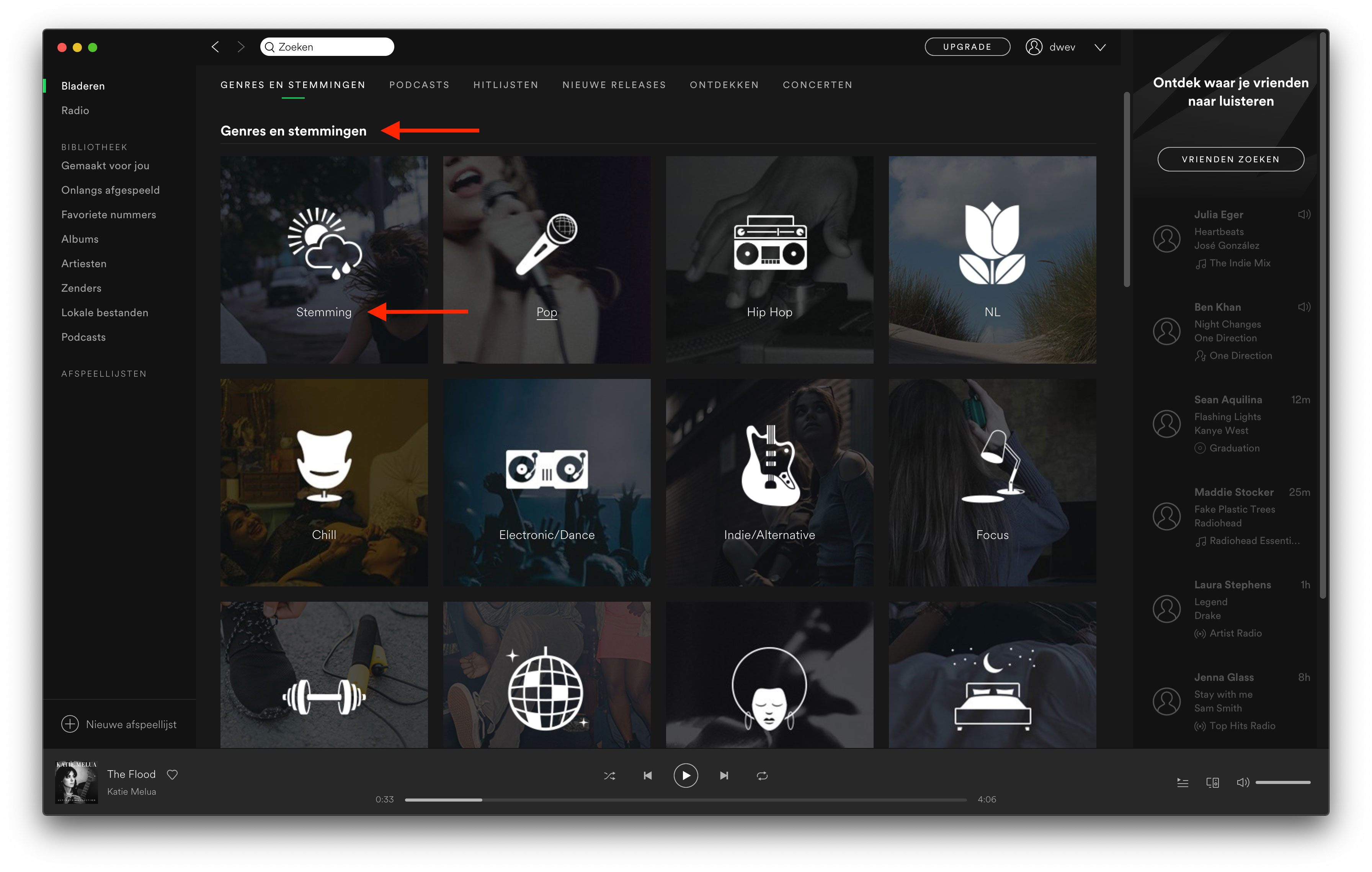
Spotify blijkt onze stemmingen te willen sturen
Bij het nieuws over ongebreidelde data-honger zijn het vaak vooral Facebook en Google, en mogelijk ook Amazon. Maar er zijn nog een aantal andere bedrijven waarbij je je moet afvragen of je daar gebruik van moet maken, en opvallend genoeg blijkt Spotify daar ook bij te zitten.
Opvallend, want de gratis optie van Spotify wordt bekostigd door advertenties, ‘betaal’ je als gebruiker dan niet al ruim voldoende door je muziek steeds te laten onderbreken door reclame? Volgens Spotify
kennelijk niet, en dat is ook meteen de reden dat als je Spotify opstart je linksboven “Genres en stemmingen” ziet staan. Als je daar op “Stemming” klikt dan krijg je maar liefst 92 verschillende opties te zien, en die zijn erg belangrijk voor Spotify.

Spotify blijkt onze stemmingen te willen sturen
Want op weg naar een beursgang blijkt Spotify dit te doen om de waarde van het bedrijf zo groot mogelijk te maken, het voorspellen van onze stemmingen blijkt inmiddels één van de Unique Selling Points van dit bedrijf en deelt het die data met de grootste marketing- en reclamebureaus.
But a more careful look into Spotify’s history shows that the decision to define audiences by their moods was part of a strategic push to grow Spotify’s advertising business in the years leading up to its IPO—and today, Spotify’s enormous access to mood-based data is a pillar of its value to brands and advertisers, allowing them to target ads on Spotify by moods and emotions. Further, since 2016, Spotify has shared this mood data directly with the world’s biggest marketing and advertising firms.
Spotify’s ambities zijn dan ook erg groot, Spotify’s marketing chief, Seth Farbman, was daar in het verleden
erg open over:
What’s the breakdown in revenue from subscriptions versus advertising? What’s the ultimate business objective?
Mr. Farbman: The ambition has changed tremendously. A vast majority of our revenue still comes from subscriptions. In the foreseeable future, that will still be a main driver, but we started to watch the media landscape change. We saw what was happening with a real sort of bifurcation of digital media. Basically, it’s Google, Facebook and everybody else. We thought, it seems like there’s an opportunity for a third way, for another option. We said this is where we’ll put even more emphasis.
You really have an ambition to be a third-largest player? How do you plan on growing that much?
Mr. Farbman: Absolutely, but it’s a journey to get there. We need to tell our story better. Marketers of today are really worried about brand safety. Here [at Spotify] you’re inside a controlled environment. We have to reinforce that and then continue to introduce a lot of the simple ways you can access the platform.
Deze ambitie heeft er dus voor gezorgd dat stemmingen centraal staan, waarbij Spotify ‘de edele taak’ op zich neemt om ons altijd richting positieve en gebalanceerde muziek te sturen. Op zijn minst iets om in het achterhoofd te houden als je de ‘gratis’ optie gebruikt, op zijn slechts misschien een reden om dit soort Big Brother gedrag achter je te laten.
Spotify’s treatment of its mood and emotion data as a form of currency in the greater data marketplace should be considered more generally in the context of the tech industry’s rush to quantify our emotions. There is a burgeoning industry surrounding technology that alleges to mine our emotional states in order to feed AI projects; take, for example, car companies that claim they can use facial recognition to read your mood and keep you safer on the road. Or Facebook’s patents on facial recognition software. Or unnerving technologies like Affectiva, which claim to be developing an industry around “emotion AI” and “affective computing” processes that measure human emotions.
It remains to be seen how Spotify could leverage such tech to maintain its reputation as a mood-boosting platform. And yet we should admit that it’s good for business for Spotify to manipulate people’s emotions on the platform toward feelings of chillness, contentment, and happiness. This has immense consequences for music, of course, but what does it mean for news and politics and culture at large, as the platform is set to play a bigger role in mediating all of the above, especially as its podcasting efforts grow?
PrivacyAls laatste, als we het hebben over privacy dan mag een link naar
dit artikel van Maciej Ceglowski niet ontbreken. Zelden heeft iemand zo goed en compact verwoord waarom privacy zo ontzettend belangrijk is, en waarom het de moeite is om de recente en plotselinge ommezwaai van Facebook en Google op dit gebied op zijn minst heel erg kritisch te volgen.
#Spotify #AppleMusic